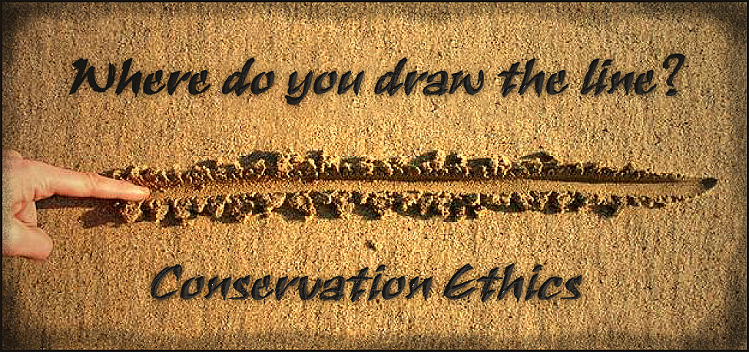
|
Putting the "Public" Back In "Public Trust" " Where do you draw the line?"
Should
our state wildlife agency be allowed to violate our wildlife
law for politics? When do we uphold personal conservation ethics,
as individuals or the collective of a conservation organization?
When it is politically convenient? What
will the cost be? These
are questions I thought on last night, after fighting a major
uphill battle in the last week and a half, even against other
conservationists, simply to file a lawsuit on Friday before
a deadline. The complaint is against our Montana Fish, Wildlife
& Parks and Montana Fish & Wildlife Commission which
has bypassed the required Environmental Impact Study in favor
of the political Elk Management in Areas with Brucellosis program
and subsequent Work Plans. The FWP elk brucellosis plan, within
4 Montana counties, involves pasture wide, tall, wildlife obstructing
fences paid for by sportsmen dollars; kill permits and removal
hunts with no private landowner requirement of public hunter
access as in current game damage laws, in essence anytime of
the year – basically a move towards privatizing our wildlife.
This is not scientific wildlife management and is violating
Montana law. The public should never have had to go to court
to get our wildlife agency to follow these laws. Conservationist
and author David Petersen wrote, "A minimal level of sportsman
ethics afield is mandated by written law. Beyond that, say,
when an action is legal but ethically questionable, or when
(as Aldo Leopold long ago pointed out) no one is watching, hunter
ethics is an individual responsibility. As the existentialists
would have it, we determine our own honor minute by minute,
action by action, one decision at a time." Very good words to
live by. But is it also applicable for "conservation"? In
the most basic terms, conservation is protecting something from
harm or destruction. So let's replace the word “sportsman”,
in Petersen's quote, with “conservationist”. Some conservation
ethics is mandated by law, with state and federal agencies acting
as trustees for the Public Trust. At a bare minimum, we need
our agencies to abide by the mandated laws set in place to conserve
and manage. Above that, you hope that they are a conservationist,
rather than just a political bureaucrat. Montana Fish, Wildlife & Parks and the FWP Commission are members of the Western Association of Fish and Wildlife Agencies (WAFWA). In WAFWA's Public Trust Doctrine Resolution it mandates, “that fish and wildlife resources are to be held in trust by government for the benefit of present and future generations.” It further states, “...the public must be made aware of this Public Trust, and it must be enforceable against the government.” Richard Kroger, retired BLM, wrote a book, “Choosing a Conservation Vocation or a Bureaucratic Career: Personal Choices and the Environmental Consequences.” In it he states, “In essence, big money interests of our society use the political process to set the stage for unsustainable natural resource use, but it is the bureaucratic careerists in government agencies who embrace the orders to carry out the destructive missions which result in needless degradation of our environment... All that is necessary is for more natural resource professionals in government agencies to do their lives' work as dedicated conservation vocationists rather than self-serving bureaucratic careerists who always conform to the interests of the powerful big money interests.” On a personal/individual conservation level, or that of the conservation organizations, conservation ethics seem to be a gray area for some and that may be an understatement in some cases. Politics directs actions and agendas, rather than the basic principle of protecting something from harm or destruction, or as Leopold put it, “Ethical behavior is doing the right thing when no one else is watching - even when doing the wrong thing is legal.” Foremost, is it right to favor political and personal relationships over scientific wildlife management and wildlife law? Is it conservationally right to politically throw one species under the bus in an effort get your favored species out? Is
it right to prevent or obstruct others from legally seeking
redress from governmental conservation violations? I
would be curious how the actions of some "conservationists"
over the last 2 years of this elk brucellosis debacle, even
up to the very morning of our trying to get this lawsuit filed
on Friday, would stand in the light of day? Call
me an idealist, but I believe in conservation, in the purest
sense. I dont believe that the teachings and works of the early
conservationists, such as Roosevelt, Pinchot, Muir, Leopold,
Grinnell, Thoreau, or even contemporary conservationists are
merely so we can get a warm fuzzy feeling while reading or quoting
them, a moral high. Conservation
is a moral partnership between the present and future generations.
And as Petersen put it, "...we determine our own honor minute
by minute, action by action, one decision at a time."
Enhancing Montana's Wildlife & Habitat v. Montana Department of Fish, Wildlife & Parks and Montana Fish & Wildlife Commission Filed Jan. 9, 2015, 3:46 PM Case No. ADV 201522
|
14/12/2014 Enhancing
www.EMWH.org For More EMWH
|

